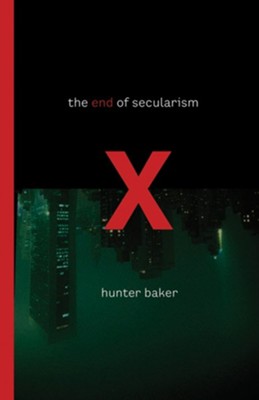or checkout with

Have questions about eBooks? Check out our eBook FAQs.
Product Description
▼▲Product Information
▼▲| Title: The End of Secularism - eBook By: Hunter Baker Format: DRM Free ePub Vendor: Crossway | Publication Date: 2009 ISBN: 9781433523236 ISBN-13: 9781433523236 Stock No: WW7607EB |
Related Products
Publisher's Description
▼▲This ambitious work offers one of the most comprehensive attacks on secularism yet attempted. Hunter Baker argues that advocates of secularism misunderstand the borders between science, religion, and politics and cannot solve the problem of religious difference.
University scholars have spent decades subjecting religion to critical scrutiny. But what would happen if they turned their focus on secularism? Hunter Baker seeks the answer to that question by putting secularism under the microscope and carefully examining its origins, its context, its claims, and the viability of those claims.
The result of Baker's analysis is The End of Secularism. He reveals that secularism fails as an instrument designed to create superior social harmony and political rationality to that which is available with theistic alternatives. Baker also demonstrates that secularism is far from the best or only way to enjoy modernity's fruits of religious liberty, free speech, and democracy. The End of Secularism declares the demise of secularism as a useful social construct and upholds the value of a public square that welcomes all comers, religious and otherwise, into the discussion. The message of The End of Secularism is that the marketplace of ideas depends on open and honest discussion rather than on religious content or the lack thereof.
Author Bio
▼▲Hunter Baker (PhD, Baylor University; JD, University of Houston) serves as a university fellow and associate professor of political science at Union University in Jackson, Tennessee. Baker also serves as an associate editor for the Journal of Markets and Morality and as a contributing editor for Touchstone: A Journal of Mere Christianity. He is also a research fellow of the Southern Baptist Ethics & Religious Liberty Commission.
ChristianBookPreviews.com
▼▲The End of Secularism is a thorough book. The Introduction is essential reading for understanding the text, as well as understanding the author. In it Baker gives a first-hand narrative of how he came to his thesis in his personal journey. The first third of the book covers the history of bringing one's personal faith into the public square. He discusses the ancient church and the Reformation, as well as the French Revolution. Baker spends the most time, however, discussing the way that faith and politics have related to one another in the public square in the United States of America.
Baker believes that as America has developed, we have acquired an ethos that relegates religion to private and personal space, and politics and science to the public sphere. Thus, religion is ones "personal business" and part of ones "personal life," but as a culture we find it difficult when people bring their faith in the public sphere, especially in matters of medicine, the academy, and public policy. This clear delineation Baker refers to as secularismbecause our public lives need to be lived without deference and reference to our religious convictions and commitments. He says of secularists as he grew up, "Expressions of public faith offended them they way that pornography offended certain other people" (p. 11).
Baker is generous with the secularists. He believes that much of the way our culture deals with religion and politics has to do with somewhat good intentions. For the most part, after years of arguing about religion in public, secularist society has chosen to push faith to persons personal lives out of a desire for peace. Also, secularism, in light of such arguments, pushed religion to the private sphere of living as a way of honoring its importance without making it a matter of public policy. This has not been entirely bad for religion either. Christian evangelicalism gained strength in this environment that focused on faith as a "personal decision for Christ."
The End of Secularism as a title is, of course, a double meaning. Baker believes that the end goal of secularism is to marginalize matters of faith, and the author believes in our current environment religious faith cannot be left out of the public discourse. Thus secularism is being exposed by the author as a poor idea, and an idea that is coming to an end. Do you agree? Read and find out! Clint Walker, www.ChristianBookPreviews.com
Ask a Question
▼▲Find Related Products
▼▲- Books, eBooks & Audio >> Academic >> Philosophy >> Western Philosophy >> Modern Philosophy
- Books, eBooks & Audio >> Academic >> Philosophy >> Western Philosophy >> Philosophy
- Books, eBooks & Audio >> eBooks >> Academic >> Philosophy >> Western Philosophy
- Download >> eBooks >> Academic >> Philosophy >> Western Philosophy
Author/Artist Review
▼▲Ask a Question
What would you like to know about this product? Please enter your name, your email and your question regarding the product in the fields below, and we'll answer you in the next 24-48 hours.
If you need immediate assistance regarding this product or any other, please call 1-800-CHRISTIAN to speak directly with a customer service representative.


